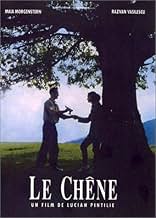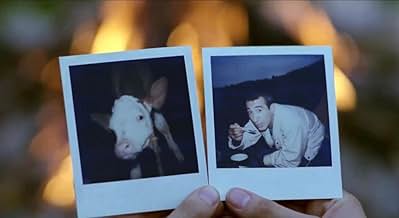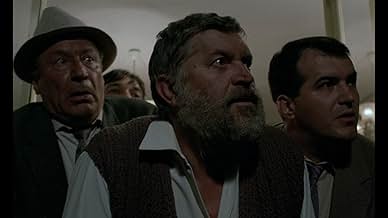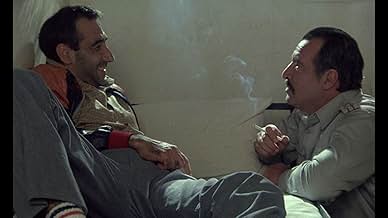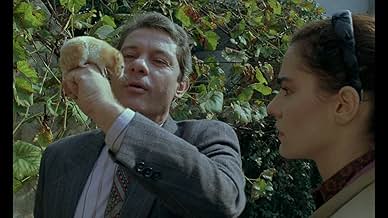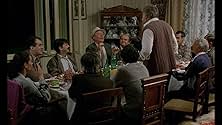NOTE IMDb
7,8/10
4,1 k
MA NOTE
Une description de la Roumanie avant la chute de Ceausescu, à travers l'histoire de Nela, qui alors qu'elle vient de perdre son père, décide de quitter Bucarest, préférant enseigner dans une... Tout lireUne description de la Roumanie avant la chute de Ceausescu, à travers l'histoire de Nela, qui alors qu'elle vient de perdre son père, décide de quitter Bucarest, préférant enseigner dans une petite ville de province.Une description de la Roumanie avant la chute de Ceausescu, à travers l'histoire de Nela, qui alors qu'elle vient de perdre son père, décide de quitter Bucarest, préférant enseigner dans une petite ville de province.
- Réalisation
- Scénario
- Casting principal
- Récompenses
- 3 victoires et 1 nomination au total
Avis à la une
10Rigor
Lucian Pintilie finds a remarkable balance between bitter ironic comedy and unflinching political analysis in this breathtaking film. This is a key work in the "post cold war" era that should be seen by anyone who really appreciates the art and craft of cinema. This is a narrative of our time, told with bold, brave abandoned. The screenplay is one of the best of the 1990's and the performances are flawless. The film's actual rootedness in Romainian politics and culture is refreshing in an era of often compromised Euro-co-productions. It is this specificity that actually opens the door to "universal" themes and values.
Society has always been depraved and almost worthless in its general aspects. Now, to look at how people behave during a detention-like state is even more interesting, which swiftly brings me to the following affirmation: living under a dictatorship draws a clear distinction between the elite and the rest. It elevates true values, which unfortunately have to be kept under secrecy due to the paranoid mentality of the government. But the beauty of it, the absolute splendor is to see how these courageous people come together, despite having to sacrifice and risk a lot. I suppose people with similar traits are drawn to one another out of pure instinct.
"Balanta" portrays the destiny of two people who daringly oppose the regime, not for their own fate, but for the fate of those around them who deserve it. Their brave madness is shockingly amusing and thrives within the viewer. Even though playing against the rules can be very tricky, if done according to the (unwritten) book, it can prove extremely rewarding, especially for the spirit. Despite its sometimes eye-brow raising dialogue, Maia Morgenstern and Razvan Vasilescu scratch up reasonably good and humorous performances, pumping adrenaline into the film itself.
The movie is an awe-inspiring tribute to those who could(can) simply not adapt to the nearly psychotic way of life lead by many under totalitarian regimes. Pintile cleverly points out the discrepancies between "actual" normality and the state of things during times when normal becomes strangely unfamiliar. "Balanta" is a worthy picture, especially given its controversial nature.
"Balanta" portrays the destiny of two people who daringly oppose the regime, not for their own fate, but for the fate of those around them who deserve it. Their brave madness is shockingly amusing and thrives within the viewer. Even though playing against the rules can be very tricky, if done according to the (unwritten) book, it can prove extremely rewarding, especially for the spirit. Despite its sometimes eye-brow raising dialogue, Maia Morgenstern and Razvan Vasilescu scratch up reasonably good and humorous performances, pumping adrenaline into the film itself.
The movie is an awe-inspiring tribute to those who could(can) simply not adapt to the nearly psychotic way of life lead by many under totalitarian regimes. Pintile cleverly points out the discrepancies between "actual" normality and the state of things during times when normal becomes strangely unfamiliar. "Balanta" is a worthy picture, especially given its controversial nature.
At the time I read the book the film is based on, it was a reflection of the reality surrounding us, in Romania, therefore after the first print it was banned by the Ceausescu's communist regime. As time went by, I emigrated in the US, and seen the movie 10 years after I've read the book and although the movie supposedly is a fiction, it played like a documentary in front of my eyes. It is hard, as a Romanian, to disconnect from my personal experiences, but if anybody is interested in what the communism in Romania was like, this movie is the way to find out. The tragic and the comedy are coming together to weave the fabric of a society so sick, that life becomes surreal. For my money this is a great movie, the fresco of a society governed by rules unknown to civilization.
Actually the Romanian title of the movie would be "Balance" or "Scales" or "Steel Yard", pick the word most appropriate to your liking for the weight measuring gadget. The international titles (The Oak, la Chene) are linked to the last scene of the movie that metaphorically wraps up significations. The main characters have found the long sought, yet not traceable balance, equilibrium.
Why did I say that it depicts humiliation of intelligence and culture? In communist Romania people that graduated university or college were repartitioned to a job matching their studies. Only the luckiest got a repartition in a large city. Others were summoned for life in hamlets, as you could not promote or change your repartition unless joining the Party. That's the case with the leading character (Maia Morgenstern) that graduated Psichology in Paris, and was repartitioned in Copsa Mica, the most polluted city in Romania.
The caravan of insults starts with the train journey to her new work place. She is forced to switch trains in the night, take her clothes off in the presence of strangers, and ride 400 km standing in an overcrowded train. As she reaches Copsa Mica some people try to rape her, police torture and threaten her, and so on.
To certify the adage that special people congregate the Psichology graduate meets a funky doctor, that manages to elude the system by being some kind of a joker. Then the rejoicing begins as these 2 people get to know each other.
When they decide under the oak tree to give birth to a child she says: "I pray he won't be normal" and he responds "If he'll be normal I'll kill him with my own hands." For these two people being "normal" meant the supreme course. Everybody around was dull, normal and communist. Enjoy!
Why did I say that it depicts humiliation of intelligence and culture? In communist Romania people that graduated university or college were repartitioned to a job matching their studies. Only the luckiest got a repartition in a large city. Others were summoned for life in hamlets, as you could not promote or change your repartition unless joining the Party. That's the case with the leading character (Maia Morgenstern) that graduated Psichology in Paris, and was repartitioned in Copsa Mica, the most polluted city in Romania.
The caravan of insults starts with the train journey to her new work place. She is forced to switch trains in the night, take her clothes off in the presence of strangers, and ride 400 km standing in an overcrowded train. As she reaches Copsa Mica some people try to rape her, police torture and threaten her, and so on.
To certify the adage that special people congregate the Psichology graduate meets a funky doctor, that manages to elude the system by being some kind of a joker. Then the rejoicing begins as these 2 people get to know each other.
When they decide under the oak tree to give birth to a child she says: "I pray he won't be normal" and he responds "If he'll be normal I'll kill him with my own hands." For these two people being "normal" meant the supreme course. Everybody around was dull, normal and communist. Enjoy!
This is the opposite of a Hollywood movie. This is a piece of reality and there is nothing glamorous about it. That's what makes "The Oak" a great movie, an experience to remember.
I am Romanian and I avoided this movie when I was in Romania, because of its subject. Last weekend, I found it in a video store in Seattle and I had to rent it. I am very glad I did and recommend it to all the European film lovers. It will give you an idea (in case you didn't experience it yourself) of what living under the communism meant, with all the pain, frustration and the happier moments.
I am Romanian and I avoided this movie when I was in Romania, because of its subject. Last weekend, I found it in a video store in Seattle and I had to rent it. I am very glad I did and recommend it to all the European film lovers. It will give you an idea (in case you didn't experience it yourself) of what living under the communism meant, with all the pain, frustration and the happier moments.
Le saviez-vous
- ConnexionsFeatured in Filmare/Filmage (1992)
Meilleurs choix
Connectez-vous pour évaluer et suivre la liste de favoris afin de recevoir des recommandations personnalisées
Détails
Box-office
- Budget
- 3 700 000 $US (estimé)
Contribuer à cette page
Suggérer une modification ou ajouter du contenu manquant


